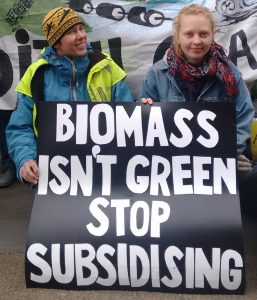 The two changes announced by the Government apply to Contracts for Difference (CfDs), which are the new scheme for renewable electricity subsidies phased in from 2014-17. Previously, all biomass plants attracted a different subsidy, called Renewable Obligation Certificates (ROCs). ROCs are now closed to new developments. CfDs are awarded via auction in which all developers of eligible schemes compete. The auctions are decided on purely financial criteria, but the Government decides which schemes are eligible.
The two changes announced by the Government apply to Contracts for Difference (CfDs), which are the new scheme for renewable electricity subsidies phased in from 2014-17. Previously, all biomass plants attracted a different subsidy, called Renewable Obligation Certificates (ROCs). ROCs are now closed to new developments. CfDs are awarded via auction in which all developers of eligible schemes compete. The auctions are decided on purely financial criteria, but the Government decides which schemes are eligible.
1) New biomass power stations can no longer get subsidies unless they operate as combined heat and power plants with a minimum efficiency of 70%. Previously, they only had to achieve 35% total efficiency. To our knowledge, the only biomass CHP plants that achieve 70% in the UK are quite small plants supplying for example schools with heat and power. The new rule affects any purpose-built biomass plant, with the exception of plants classified as using ‘advanced conversion technology’, i.e. gasification or pyrolysis. It does not apply to coal-to-biomass conversions – but we expect future conversions to be ruled out by the second rule change;
2) New subsidies will only be granted for burning biomass that meets a much lower greenhouse gas limit than at present. The Government still uses an outdated and unscientific methodology that doesn’t look at emissions from logging or from burning wood. Nonetheless, no imported wood pellets burned in UK power stations today meet the new limit. That’s because the fossil fuel emissions from processing and shipping the pellets are too high. This standard will apply to biomass CHP plants, biomass used in gasification and pyrolysis plants, and coal-to-biomass conversions. Note that subsidies are awarded separately for each unit of a coal power station converted to biomass. So there seems to be no risk of Drax being able to convert any more units to biomass when the coal units have to close in 2025.
What about biomass and/or waste gasification and pyrolysis plants?
Hardly any electricity has been produced from such plants in the UK ever, due to major technical challenges. New plants of this type won’t have to meet the 70% efficiency requirement in order to be awarded subsidies, but they will have to meet the new greenhouse gas limit for biomass. Furthermore, the Government is now consulting on additional changes which we hope will stop many of the least efficient and most polluting developments of this type. It’s too early to be sure, though.
